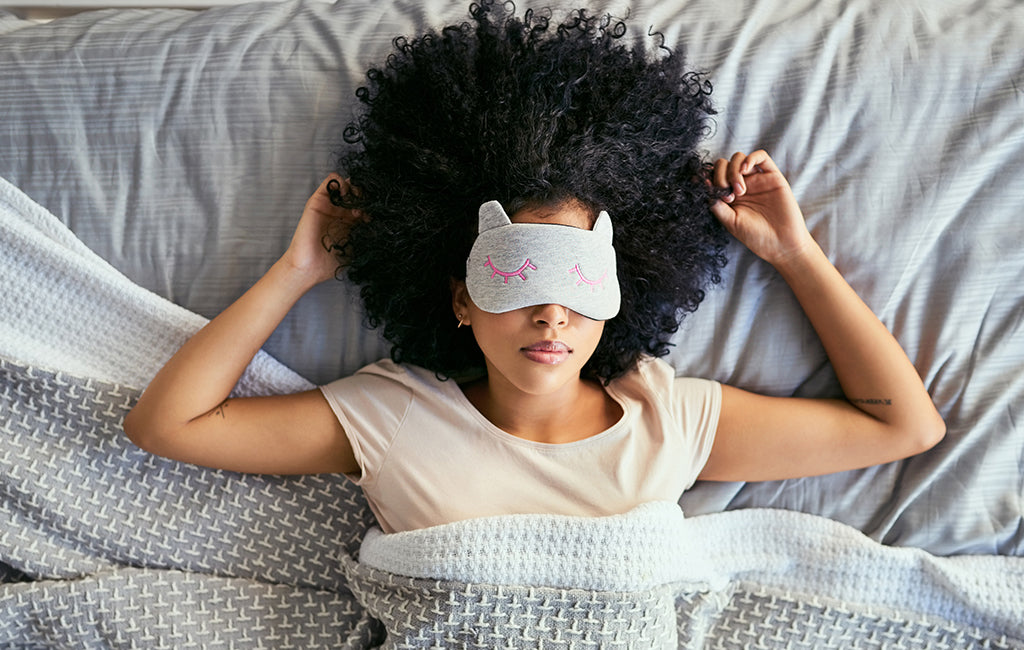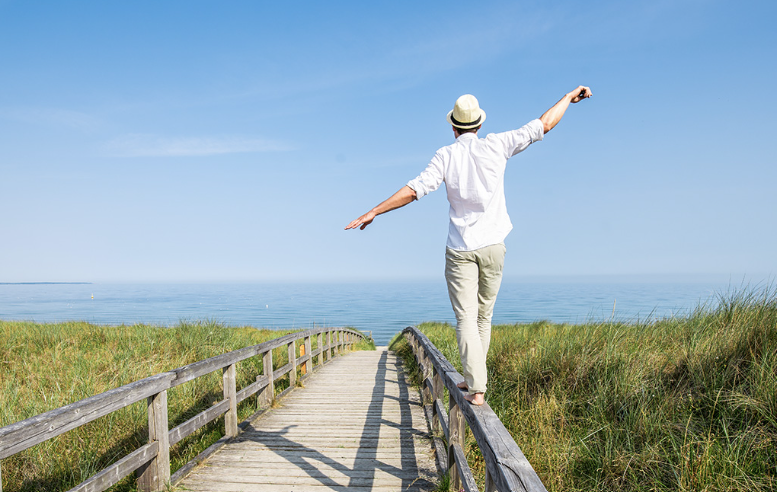
Did you know that as many as one-in-three adults in the United States don’t usually get the sleep they need? If you’re among those who wake up in the morning wishing you could hit the snooze button over and over again, you’re probably missing out on valuable Z’s.
However, it’s difficult to figure out how to squeeze more sleep into every night. Family, work and social commitments can crowd your schedule, leaving little room for extra rest. Or maybe you try to get into bed on time each night only to lie awake for hours tossing and turning.
Either way, it’s important to find ways to get more deep sleep. This guide is packed with tips to help you slip into bed earlier every night and get the most out of your sleep.
How Much Sleep Do You Need?
The National Sleep Foundation recommends that most adults get between 7 to 9 hours of sleep each night. It’s important to note that this recommendation is general and doesn’t account for:
- Your activity level
- Illnesses you have
- Medications you’re on
The sleep quality you get every night also matters. If you spend your nights tossing and turning, you won’t feel refreshed in the morning. Instead, you’ll wake up feeling groggy, crabby and unprepared for the day when your alarm clock goes off.
One night of poor sleep will leave you with a general feeling of malaise. However, many nights of poor or short sleep can have serious health consequences. In short, sleep is a must for maintaining optimal health and quality of life.
Why is Sleep So Important?
It might seem silly that sleep is so important. After all, you aren’t doinganything. However, while you’re dreaming of fields of flowers, your body is hard at work. Sleep is necessary for your essential bodily functions to reset and properly prepare you for the next day.
Some of the critical tasks your body performs when you sleep include:
- Reduction in heart rate and body temperature
- Relaxation of muscles
- Repair and growth of tissue
- Release of hormones
- Restoration of needed energy
Without enough sleep, your body can’t perform these resets. You’ll wake up with a less than full tank of energy anda body that hasn’t been primed to start a new day. Over time, your body and its functions will begin to wear down and not perform as needed.
One way to ensure you’re reaching your sleep targets is to get into bed earlier. Sleep habits like this give your body more time to settle in and get the rest you must have. However, getting into bed earlier can be tough — it takes planning, practice and maybe a bit of CBD to perfect an early bedtime.
Let’s look at some steps you can take to ensure you’re maximizing the quality and quantity of your sleep.
Tip #1: Get Plenty of Exercise
Exercise is critical for good health. It can also impact your ability to sleep well, just maybe not in the way you expect. Conventional wisdom has stated that you shouldn’t exercise too close to your bedtime because you’ll have trouble falling asleep.
However, a review of studies related to exercise timing and sleep showed no link between poor sleep and exercise up to an hour before bed.
This seems to indicate that it’s more important that you fit daily exercise in whenever you can than it is to time it perfectly. CDC recommendations for adult exercise include:
- Aerobic exercise – 150 minutes per week of moderate-intensity aerobic exercise is a must. This can include brisk walking, biking, hiking, jogging, swimming or other movements that elevate your heart rate.
- Strengthening moves – At least two sessions of strengthening exercises targeting major muscle groups such as the hips, glutes, shoulders, chest and back. These moves can use your body weight, dumbbells or resistance bands.
- Flexibility work – Activities such as yoga for sleep and relaxation or stretching can help keep your muscles and tendons loose and limber. This will help keep you healthy so you can keep up with your other daily workouts.
Reaching these movement targets can help you get more restful sleep because exercise improves your overall health. There is a clear link between health and quality sleep. Conversely, poor health and poor sleep are also interconnected.
Tip #2: Stay Awake During the Day
If you are a fan of naps butstruggle to figure out how to sleep early at night, you might want to forego your daytime snooze. If you’re consistently taking a long nap in the afternoon and staring at your ceiling at night, you might be throwing off your natural sleeping and waking cycle. Staying awake all day might help you get your body back on track andcan help you get to bed earlier.
That being said, short naps canbe beneficial, especially if you were a little short on sleep the previous night. The National Sleep Foundation recommends the following for mid-day nappers:
- Keep your naps short — no more than 20 minutes
- Try to nap before 2 p.m. to avoid any interruption of nighttime sleep
- Nap in a dark, quiet place
Tip #3: Be Aware of Caffeine Intake
Limiting caffeine from coffee, tea or energy drinks can also help you get ready to tumble into bed at an earlier hour. A study by the Journal of Clinical Sleep Medicine tested the impact of 400mg of caffeine when it was consumed six, three and zero-hours before sleep. It was found that caffeine seriously impacted the quality of sleep at all three time intervals.
Thus, the study concluded that caffeine was disruptive to sleep and should be avoided at least six hours before bedtime.
If you’re shaking your head and worrying about how you’re going to survive the afternoon without your 3 p.m. cup of coffee, relax. Chewing a few CBD Gummies might help enhance your energy and focus without the after-effects of a cup of coffee. If it’s a hot drink you crave in the afternoon, try sipping on herbal tea or decaf coffee instead.
Tip #4: Avoid Blue Light Before Bed
After dinner, many people spend their time winding down by scrolling through their phones or watching their favorite TV show. However, this habit can harm your sleep schedule. Exposure to blue light, such as the light emitted by your phone, can interrupt the secretion of melatonin. This interrupts your circadian rhythm and makes it difficult to fall asleep.
We know that it can be tough, especially when there’s so much going on that you want to keep up with. However, setting an alarm that reminds you to put your phone away in the hour or two before you slip into bed can have a positive impact on:
- The quality and duration of sleep
- Your energy levels the next day
- Your ability to focus and remain alert
So, wrap up that last Twitter scroll at least an hour before bed. You’ll be glad you did when you have an easier time falling asleep.
Tip #5: Take a Warm Bath or Shower
Have you ever taken a shower, put on your favorite pajamas and then had the best night of sleep? It turns out that this isn’t a coincidence. A warm shower or bath before bed causes your body temperature to drop, priming you for restful sleep.
When you’re preparing your bedtime bathing routine, there are a few things to keep in mind:
- The water should be warm but not hot — aim for 104 to 108.5 degrees Fahrenheit
- One to two hours before bedtime is ideal
- Make sure you give yourself enough time to dry off completely before sleeping
That last point is important — you don’t want wet hair to soak your pillow. This can cause you to wake up cold and clammy later in the night.
Tip #6: Stick to a Consistent Sleep Schedule
It can be difficult to go to bed and wake up at the same time every day. Life happens and we find ourselves up way past our planned bedtime. However, there are significant benefits to picking and sticking to a consistent sleep schedule. In short, a consistent sleep schedule will:
- Help your body maintain its internal clock
- Assist you in falling asleep more quickly
- Make it easier to wake up in the morning
- Give your body the sleep it needs
One thing you might not like about sticking to a schedule for sleep is that it’s most effective when you do it all of the time — even on the weekends. This can take some getting used to, especially if you’re someone who likes to make the most of your time off work.
However, you’ll reap the benefits all week when you make an effort to stay on track — even on the weekends.
Tip #7: Perfect Your Sleeping Environment
Making your sleeping environment comfortable and cozy may help to promote more restful sleep. To that end, here are a few key components to incorporate when cultivating an ideal sleep space that’s conducive to sleep:
- Temperature – Your sleeping environment should be kept nice and cool. This will help you sleep better than you would in a hot, stuffy space.
- Light – You should also strive to keep your sleeping space dark. This means blocking light from other rooms, using blackout drapes and keeping televisions and other screens out of the room.
- Sound – Finally, you want a quiet space to rest. This means no television, radio or other noise humming in the background while you sleep.
The best way to ensure that your sleeping space is optimized is to reserve it for sleeping only. This means avoiding watching TV, scrolling through your phone or even reading in bed. Making your bedroom a sleep-only space can help your brain associate your room with deep rest rather than wakeful activities.
Tip #8: Craft a Comforting Routine
Your actions leading up to when you climb into bed can impact how well you sleep. Humans are creatures of habit. When we get into a routine, we learn from it and like to stick to it.
Thus, curating a comforting and soothing pre-bedtime routine and practicing good sleep hygiene can have big benefits on the quality of your sleep. Over time, when you launch your evening routine each evening, your body will begin to recognize that it’s almost time for rest. Some activities that can help you relax before bed include:
- Listening to quiet music
- Practicing meditation or gentle yoga
- Eating a small snack or sipping some herbal tea
- Reading a good book
- Doing a puzzle or word game — but not on your phone
- Writing in a journal
- Making a to-do list for the next day
These activities can help your brain begin to turn off after a busy day. One thing to remember is that you should avoid blue light during this cool-down time. This means no reading or playing games on a phone or tablet. Instead, opt for paper crossword puzzles, jigsaw puzzles and regular books.
Try to select the activities that are most relaxing to you. Then perform them at the same time every night so that your mind begins to associate them with getting ready for sleep.
Tip #9: Incorporate CBD For Healthy, Restful Sleep
Sometimes we need an extra hand to help us get the healthy, restful sleep we crave. Incorporating natural sleep remedies like a CBD product into your bedtime routine may be the assist you need. If you’re new to CBD or aren’t sure where to begin in your search for the best CBD products for sleep, there are several options.
If you prefer a tasty pre-bedtime snack, you might like CBD gummies. These may help ease your restlessness and push you closer to those healthy Z’s your body craves. If gummies aren’t your thing, don’t worry. CBD Sleep Support Tablets and CBD Oils can also promote healthy, restful sleep.
Adding one of these products to your newly developed bedtime routine may help you drift off into dreamland with ease.
Catch More Z’s With Zebra CBD
Sleep is a must for overall health and wellness. However, when faced with the problem of how to go to sleep earlier, many of us struggle. An earlier bedtime requires planning throughout the day, a quality sleep space and a relaxing bedtime routine.
If you need the final piece to your health, restful sleep puzzle, we might be able to help. Zebra CBD is your trusted CBD expert. Our premium CBD products are formulated and come with our Label Accuracy Guarantee™. If you’re wondering what the difference is between CBN vs CBD, we can help with that, too.
Give yourself a late-night treat — shop our online store today for the widest selection of CBD products.
Source:
CDC. Short Sleep Duration Among US Adults. https://www.cdc.gov/sleep/data_statistics.html
Sports Medicine. Effects of Evening Exercise on Sleep in Healthy Participants. https://link.springer.com/article/10.1007/s40279-018-1015-0
Journal of Clinical Sleep Medicine. Caffeine Effects on Sleep Taken 0,3, or 6 Hours Before Going to Bed. https://jcsm.aasm.org/doi/10.5664/jcsm.3170
CDC. The Color of the Light Affects the Circadian Rhythms. https://www.cdc.gov/niosh/emres/longhourstraining/color.html
National Heart, Lung, and Blood Institute. Your Guide to Healthy Sleep. https://www.nhlbi.nih.gov/files/docs/public/sleep/healthysleepfs.pdf










